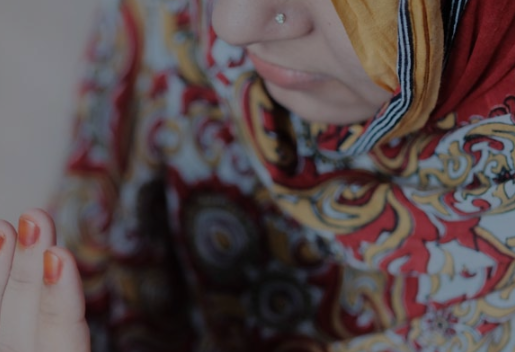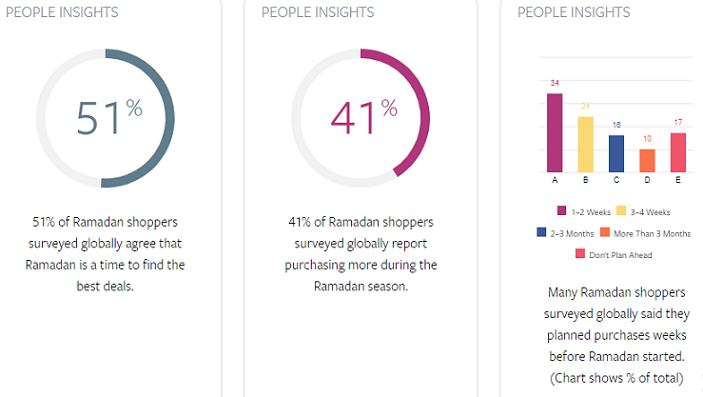 Explore how those who observe Ramadan uphold traditions and stay connected with the help of mobile and Facebook platforms—and how marketers can respectfully join the conversation.
Explore how those who observe Ramadan uphold traditions and stay connected with the help of mobile and Facebook platforms—and how marketers can respectfully join the conversation.
Ramadan is a time for renewal, spiritual reflection, connection with family and friends and inspiration for purposeful living. It is observed globally by a large and diverse community, bringing change and lifestyle shifts for close to a full month. From waking up early to prepare Suhoor, to family group chats connecting generations, it’s a time dedicated to introspection, altruism, celebration and camaraderie. And now more than ever, as the world faces COVID-19, the Ramadan teachings of caring for one another in times of crisis shed light and compassion across many communities. Because of this, Ramadan observers deserve to be met by brands in a similarly respectful and thoughtful manner.
Ramadan in 2020 will face new challenges because of COVID-19. For instance, many areas have called for the suspension of religious congregations and advised people to perform daily prayers at home.1 Traditions and plans will change, creating new needs as families navigate a rapidly shifting situation. Brands have an opportunity to create meaningful connections during Ramadan by being of service to observers and taking stands on the values and issues important to the community. This should be done in a respectful way because, while business opportunities exist during the month, it is a special time for the community, particularly now when there’s a crisis at hand.

To better understand how to create meaningful connections during this time, Facebook IQ commissioned Kantar to survey 7,087 people who reported that they observed Ramadan across nine markets (AE, EG, FR, ID, NG, PK, SA, TK, UK) during Ramadan 2019, from May 5 to June 3. The research revealed that while many of Ramadan’s moments happen in person, values and traditions are equally expressed online. Discover how brands can help observers during this busy month and uncertain times by providing useful advice, timely deals and places to connect online.
Engage on relevant platforms
Today’s Ramadan observer is empowered by technology and social media to stay connected with their local and global community. With endless app options, observers can set reminders for fasting schedules, play games in the evenings, send Eid greetings to faraway loved ones and help simplify their lives so they can focus on the things that matter most.
Our research finds that many communities that observe Ramadan use Facebook’s family of apps throughout this period; in fact, 94% of global survey respondents say they use at least one Facebook platform—often to connect with their community and loved ones.
Messaging apps play a big part in staying connected, with 85% of global survey respondents saying they use these apps to communicate with friends and family during Ramadan. And now that the World Health Organization* is recommending communities practice social distancing, people are turning to communication services like Messenger and WhatsApp to connect, and we’re seeing this behavior surge around the world.4 For example, as of March 17 globally, we’ve seen the most significant increases in Messenger usage across group calls; 70% more people are participating in group video calls, and time in group video calls has doubled globally, week over week.5 Based on this behavior, it’s likely that many Ramadan activities will happen virtually this year as observers lean on technology to preserve traditions.
Top reasons surveyed observers globally say they use Facebook, Instagram, WhatsApp and Messenger during Ramadan
Connect with loved ones
Entertainment to pass the time while hungry
Sharing religious content
Sharing Ramadan-related videos/photos
Planning Ramadan-related social activities
As a place where communities thrive, social media also allows Ramadan observers to connect in meaningful ways with brands as well as people. And our research suggests people are open to these brand connections—over half (54%) of global observers say their favorite method for brands to approach them during Ramadan is through Facebook platforms.

Although audiences are open to brand engagement, businesses should be even more thoughtful in their approaches given the challenges observers face right now as they take part in the month’s holy activities amid COVID-19. Observers tend to prefer content that speaks to the themes of Ramadan over content that simply makes use of motifs and symbols (like a crescent moon or lantern). One study found a seven-point higher brand recall for ads featuring Ramadan values (e.g., family, coming together) compared with ads featuring generic cues.6
Make shopping easy
We can tell a lot about the importance of an event by how much people prepare for it. Based on research we conducted last year, half of observers globally start planning purchases at least three weeks before Ramadan commences, whether it’s to find the best deals or identify relevant items they need.
Our research also revealed that 41% of global Ramadan observers who shop during the season report purchasing more, whether it’s to prepare the home, ready special meals or send gifts to loved ones during Eid al Fitr. With all this shopping, people are actively finding ways to save money and track down the best deals of the season. Some 51% of observers globally say Ramadan is a time to find the best deals, and in fact, the number one type of activity observers want to see from brands/businesses on Facebook during Ramadan is good deals, like promotional offers or discounts. And as lives and income streams are affected globally during this pandemic, we predict Ramadan observers will be even more mindful of the best deals.
Although businesses sometimes shy away from communicating commercially during Ramadan, consumers often value content that provides shopping value—if presented tastefully. For instance, brands can remind observers of the household products they may need weeks before Ramadan commences or connect people with recipe ideas to prepare after fasting practices end.
Help lighten the load
Ramadan is a busy time and observers are responsible for a wide range of activities—for instance, there’s sprucing up the home, cooking iftar and finding gifts for loved ones. By providing valuable ideas and suggestions—such as time-saving tips and useful product recommendations—brands can lighten the load for observers and provide helpful services during a Ramadan happening amid a global pandemic.
Nestlé Middle East* is an example of a brand that supplied useful information and suggested helpful products during the month of Ramadan.
For Ramadan 2019, Nestlé* created a service using Facebook’s messaging platform Messenger where people could get advice on food, wellness and entertainment. People could choose to explore “food options,” for example, and get a series of recommended dishes for iftar—such as eggplant and kofta bechamel with tahini—using Nestlé brand ingredients in the recipe. Read the full success story here.
2.9X more time spent on Nestlé website compared to traffic from usual Facebook campaigns
35% of people interacted with the bot during more than one session
30% of people who interacted with the bot subscribed to the recipe section
For many Ramadan observers, this is the most important moment in the year, and now during the COVID-19 outbreak, lives will transform and practices may change. Marketers should be respectful and join the conversation in meaningful ways, such as by highlighting the values of Ramadan and sharing content that’s truly relevant to people’s needs during this holy month.
Source unless otherwise specified: “Ramadan 2019: A time for reflection, connection and inspiration,” consumer research by Kantar (Facebook IQ-commissioned online survey of 7,087 respondents in (AE, EG, FR, ID, NG, PK, SA, TK, UK), May–Jun 2019


